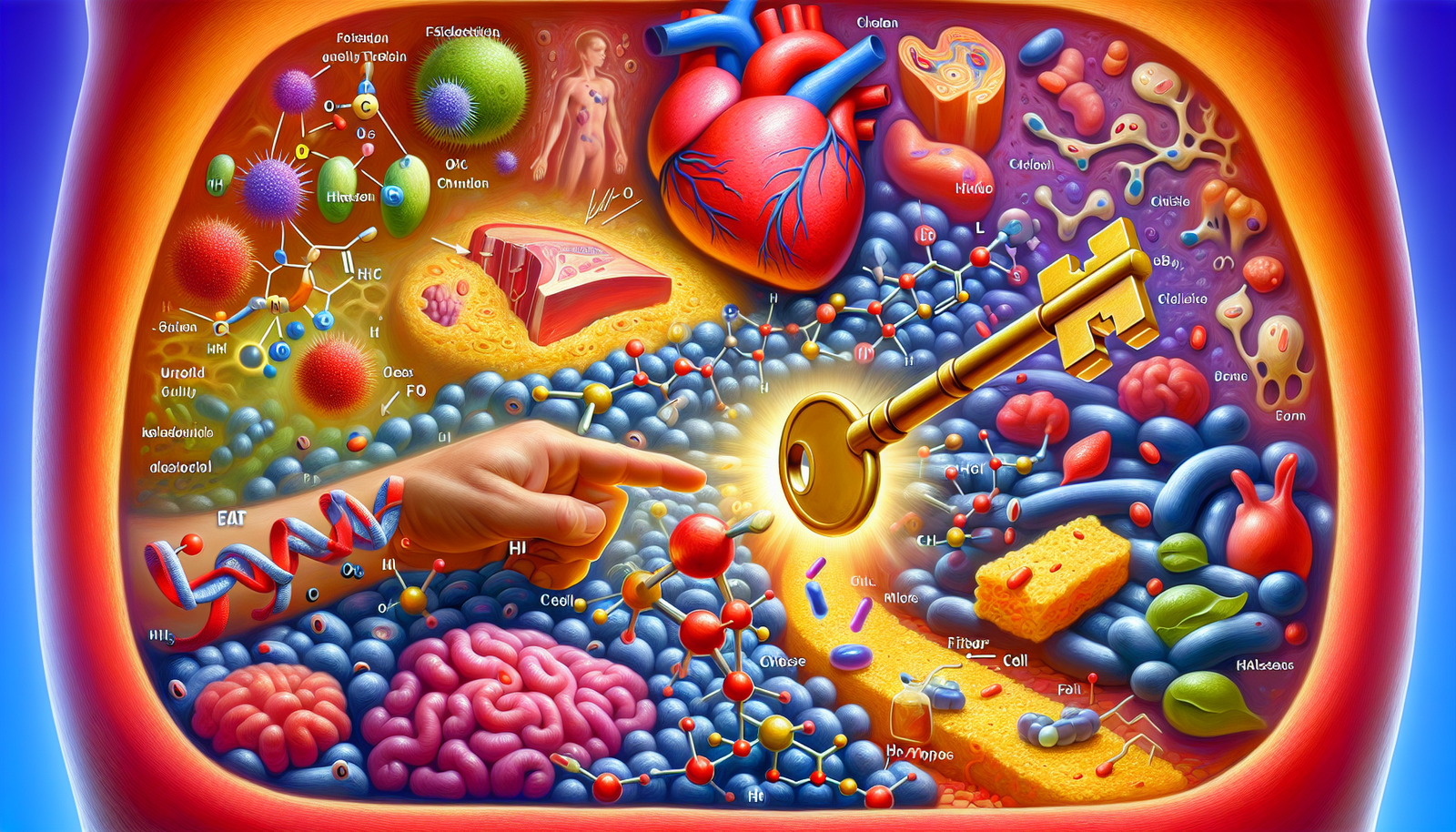The Role of Inositol in Cholesterol, Fat Usage and Waste Removal
You probably haven’t heard much about Inositol, often mislabeled as Vitamin B8, but it’s an unsung hero in your body’s ongoing efforts for healthy functioning. It’s largely responsible for aiding your body in the way it uses cholesterol and fat and is a pivotal player in the waste removal process. Specifically, it lends a helping hand in the exodus of fat cells from your liver.

Understanding Inositol
It’s not uncommon if you haven’t heard of Inositol, but you’re surely going to be surprised by how essential it is to your health. Inositol is an important molecular player in your body’s biological functions that often goes under the radar. Let’s dive into understanding it better.
Definition of Inositol
Inositol is a carbocyclic sugar that occurs in many plants and animals. It is an integral part of what makes your cellular health tick, and can come in various forms called isomers.
Inositol as vitamin B8
Inositol has often been called vitamin B8, despite the fact it isn’t truly a vitamin. Its existence is vital, and it’s found in animal and plant cells. Your body even manufactures it for its own use, making it a crucial cog in the health machine.
Why Inositol is not actually a vitamin
Despite being dubbed as vitamin B8, Inositol isn’t technically a vitamin because your body can synthesize it. Vitamins are nutrients that the body can’t manufacture on its own, and therefore must be derived externally from food. That’s why Inositol is known as a pseudovitamin.
Primary Functions of Inositol
Beyond its deceptive identity as vitamin B8, Inositol has some important roles in your health management. Let’s take a closer look at them.
Promotion of healthy cell membranes
One of the key roles of Inositol is in promoting healthy and strong cell membranes. The involvement of Inositol in numerous cellular processes, including cell growth and function, makes it critical for maintaining robust cell health.
Assistance in fat metabolism
Inositol plays instrumental roles in the biochemistry of your body, not least of which is in fat metabolism. It acts as a lipotropic agent, aiding in the transportation and breakdown of fats in your body, and potentially promoting weight loss.
Regulation of insulin in the body
Inositol has also been identified as a contributing factor in insulin signal transduction. This means that it helps in regulating and controlling how your body responds to insulin, which is a crucial aspect of maintaining healthy blood sugar levels.
Role of Inositol in Cholesterol Management
Inositol’s benefits extend to cholesterol management as well—here’s how:
Understanding Cholesterol
Cholesterol is a fatty substance that’s essential to your body, but distinct types of it can either help or harm your health. High-density lipoprotein, or HDL, is beneficial, while low-density lipoprotein, or LDL, can lead to health woes like heart disease if present in excess.
How Inositol affects cholesterol levels
Inositol is believed to help maintain a proper balance between good and bad cholesterol. By aiding in fat metabolism, it helps limit the accumulation of harmful fats, including LDL cholesterol.
Effects of Inositol deficiency on cholesterol
Inositol deficiency can have a substantial impact on cholesterol management. Without enough of it, your body may struggle to metabolize fat effectively, potentially leading to a build-up of bad cholesterol.

Inositol and Fat Usage
Inositol also interacts directly with fat usage in your body.
Mechanism of Inositol in fat usage
As an essential part of many enzymatic reactions, Inositol helps in the metabolism of fats in the liver and muscular tissue. Your stored fats can’t be metabolized without it.
Factors influencing the efficacy of Inositol in fat usage
Many factors can influence how effectively Inositol aids in fat usage. These include your diet, stress levels, exercise, and genetic factors.
Clinical study findings on Inositol and fat usage
Numerous clinical studies have shown how crucial Inositol is in managing fat usage. Many tests have demonstrated its positive effects in areas like weight loss and insulin efficiency, endorsing its importance in aiding fat metabolism.
Inositol’s Role in Waste Removal
Inositol isn’t just busy with cell health and fat management—it’s also involved in waste removal.
Understanding the process of waste removal
Detoxification is a vital bodily process that eliminates waste products. It generally happens at the cellular level, where toxic byproducts of metabolism are dealt with and eliminated.
How Inositol facilitates waste removal
One of Inositol’s significant roles is to aid in the process of detoxification, primarily by supporting the liver. It helps your liver filter out toxins, providing a protective and guiding hand for one of your body’s most important organs.
Effects of Inositol deficiency on waste removal
Just like with cholesterol management, a deficiency in Inositol can hinder the efficacy of your body’s waste removal processes. It can compromise liver function, leading to an accumulation of toxins that your body would prefer to be without.
Inositol and the Liver
Inositol has a pretty tight-knit relationship with the liver. Here’s why:
The relationship between Inositol and the liver
Your liver is a key detoxifying organ—handling a staggering variety of toxins daily. And right there, assisting in your liver’s detoxification processes is Inositol. It’s instrumental in helping your liver do its job effectively.
Impacts of Inositol on liver health
Inositol doesn’t just help with detoxification; it also contributes to overall liver health. It aids in the smooth functioning of this essential organ and even plays a role in preventing fatty liver disease.
How Inositol helps fat cells leave the liver
Inositol plays a crucial role in permitting fat deposits to be excluded from your liver. This aids to preserve your liver from becoming overrun with fat, a core factor in maintaining your liver in good health.
Sources of Inositol
Given the myriad benefits it offers, ensuring you get enough Inositol is crucial.
Dietary sources of Inositol
There are several dietary sources of Inositol. While your body can produce it, you can also get it from foods like fruits, beans, grains, and nuts.
Inositol supplements and their benefits
For those struggling to get enough Inositol through diet, supplements are available. These can provide a beneficial boost, helping to ensure your body is firing on all cylinders.
Recommendations for daily Inositol intake
While there isn’t a set daily recommended intake for Inositol, most people consume 1g daily from food. But dietary supplements can provide significantly more, often recommended by healthcare providers to ensure you’re reaping maximum benefits.
Potential Side Effects of Inositol
Like any substance, Inositol comes with potential side effects to be aware of:
Common side effects of Inositol usage
Some people might experience side effects such as nausea, fatigue, headache, dizziness, or stomach discomfort when consuming Inositol in larger quantities.
Interaction of Inositol with other substances
Inositol interacts with certain substances. It may enhance the effects of drugs that treat bipolar disorder, but could also decrease the effectiveness of certain antibiotics. It’s always important to discuss new supplements with a healthcare provider.
Safety precautions and contraindications with Inositol usage
Inositol is generally considered safe. However, pregnancies, allergies, or existing health conditions might oblige special precautions. Always consult with a healthcare provider before introducing any new supplement into your regimen.
Clinical Research on Inositol
Interest in Inositol’s potential is growing, and research is continually revealing new insights into its many benefits.
Current findings on Inositol
Current research has exposed Inositol’s key role in managing PCOS, diabetes, and mental health concerns. Positive results have been shown supporting its benefits for these conditions, amongst others.
Ongoing researches and clinical trials on Inositol
Ongoing studies continue to investigate Inositol’s capabilities. It’s in the spotlight, with trials targeting areas like metabolism, insulin regulation, neurological health, and more.
Future directions for Inositol research
The future of Inositol research looks promising. With more in-depth studies and wider application areas, the science is set to uncover even more about how this powerful molecule contributes to health and wellness.
Conclusion
Inositol’s crucial roles in cholesterol regulation, fat usage, and waste removal endorse its significance in maintaining optimal health. Greater understanding of its functions holds numerous health benefits, from improved metabolic processes to potential breakthroughs in treating health conditions.
As research continues to open fresh veins of understanding about this essential molecule, the future looks bright for Inositol, promising new insights that will help you make most of your body’s biochemical potential. So there you have it—you might not have heard of Inositol before, but I bet you won’t be forgetting about it anytime soon!

